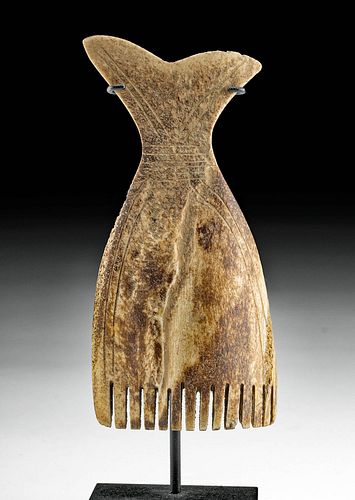12th C. Pre-Contact Yupik Bone Comb, Whale Tail Form
Lot 252
About Seller
Artemis Gallery
686 S Taylor Ave, Ste 106
Louisville, CO 80027
United States
Selling antiquities, ancient and ethnographic art online since 1993, Artemis Gallery specializes in Classical Antiquities (Egyptian, Greek, Roman, Near Eastern), Asian, Pre-Columbian, African / Tribal / Oceanographic art. Our extensive inventory includes pottery, stone, metal, wood, glass and textil...Read more
Estimate:
$700 - $1,050
Absentee vs Live bid
Two ways to bid:
- Leave a max absentee bid and the platform will bid on your behalf up to your maximum bid during the live auction.
- Bid live during the auction and your bids will be submitted real-time to the auctioneer.
Bid Increments
| Price | Bid Increment |
|---|---|
| $0 | $25 |
| $300 | $50 |
| $1,000 | $100 |
| $2,000 | $250 |
| $5,000 | $500 |
| $10,000 | $1,000 |
| $20,000 | $2,500 |
| $50,000 | $5,000 |
| $100,000 | $10,000 |
| $200,000 | $20,000 |
About Auction
By Artemis Gallery
Sep 16, 2021
Set Reminder
2021-09-16 10:00:00
2021-09-16 10:00:00
America/New_York
Bidsquare
Bidsquare : Ancient & Ethnographic Art Through The Ages
https://www.bidsquare.com/auctions/artemis-gallery/ancient-ethnographic-art-through-the-ages-7473
Ancient art from Egypt, Greece, Italy and the Near East, as well as Asian, Fossils, Pre-Columbian, Native American, African / Tribal / Oceanic, Fine art, and much more! All categories, all price ranges... all legally acquired and guaranteed to be as described or your money back. Artemis Gallery info@artemisgallery.com
Ancient art from Egypt, Greece, Italy and the Near East, as well as Asian, Fossils, Pre-Columbian, Native American, African / Tribal / Oceanic, Fine art, and much more! All categories, all price ranges... all legally acquired and guaranteed to be as described or your money back. Artemis Gallery info@artemisgallery.com
- Lot Description
Native American, Northwestern United States, Alaska, Yupik peoples, Thule period, ca. 1200 to 1700 CE. A hand carved caribou or walrus bone comb that is shaped as a whale tail. The fins curve outwards, and the tail tapers inward to the body. Incised lines outline the edges vertically and several lines transverse the center of the tail. The tip contains the 13 tines for combing. Whale effigy combs were important in ensuring a successful hunt. The wife of the hunting party's leader could not wash or comb her hair until the hunters returned, but she might wear the comb to keep her unkempt hair out of her eyes. Size: 4.5" L x 2.125" W (11.4 cm x 5.4 cm); 5.75" H (14.6 cm) on included custom stand.
Provenance: private Newport Beach, California, USA collection
All items legal to buy/sell under U.S. Statute covering cultural patrimony Code 2600, CHAPTER 14, and are guaranteed to be as described or your money back.
A Certificate of Authenticity will accompany all winning bids.
PLEASE NOTE: Due to recent increases of shipments being seized by Australian & German customs (even for items with pre-UNESCO provenance), we will no longer ship most antiquities and ancient Chinese art to Australia & Germany. For categories of items that are acceptable to ship to Australia or Germany, please contact us directly or work with your local customs brokerage firm.
Display stands not described as included/custom in the item description are for photography purposes only and will not be included with the item upon shipping.
#166451Natural ossification and surface pitting to bone. Surface abrasion vertically from neck to tines. Nicks to tines and tail. Brown patina, scattered mineral deposits, and mica flecks.Condition
- Shipping Info
-
All shipping is handled in-house for your convenience. Your invoice from Artemis Gallery will include shipping calculation instructions. If in doubt, please inquire BEFORE bidding for estimated shipping costs for individual items.
-
- Buyer's Premium



 EUR
EUR CAD
CAD AUD
AUD GBP
GBP MXN
MXN HKD
HKD CNY
CNY MYR
MYR SEK
SEK SGD
SGD CHF
CHF THB
THB













